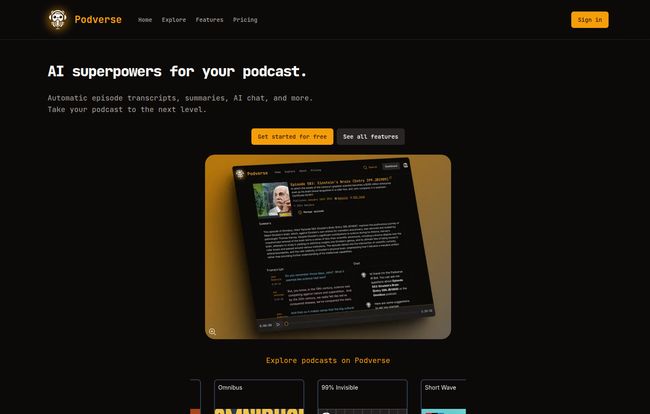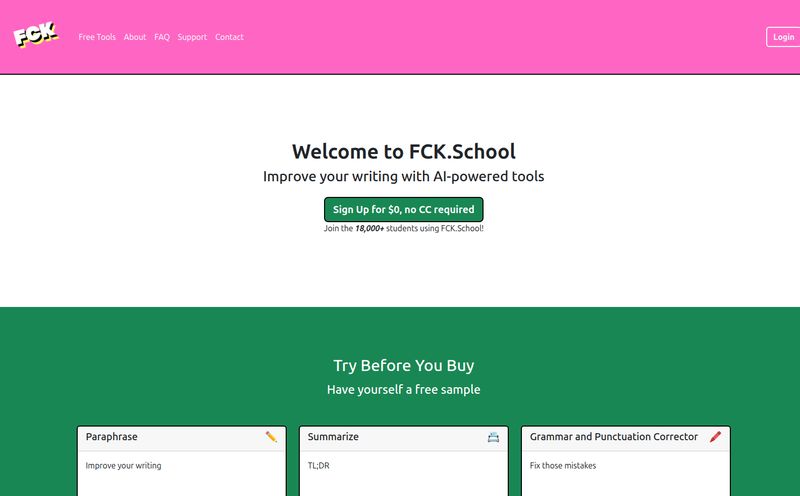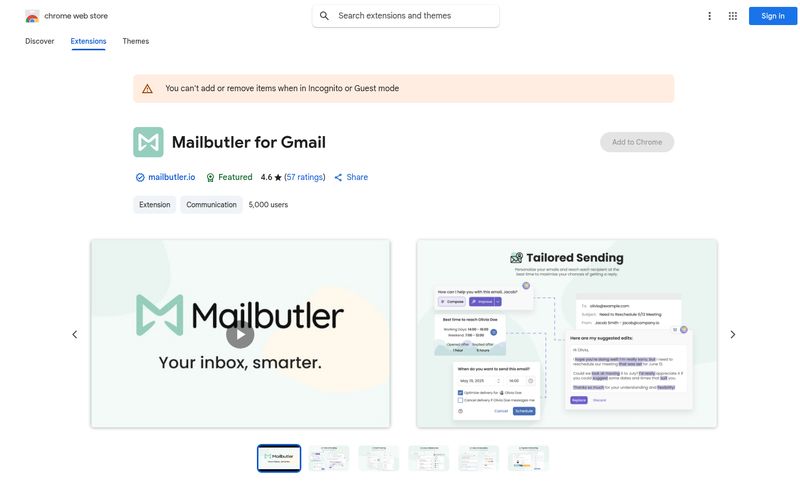I've been in the SEO and traffic generation world for what feels like a lifetime. And for most of that time, podcasts have been this... frustrating black box. You know the drill. Creators pour countless hours into producing incredible audio, rich with insights, jokes, and golden nuggets of information. And then what? It gets uploaded, and its content essentially becomes invisible to Google. A ghost in the machine.
Listeners can’t search for that one specific tip you gave. Newcomers can't quickly gauge if an episode is for them. It’s been a massive, ongoing headache for anyone trying to grow a podcast audience organically. We've tried everything, from writing long-form show notes that nobody reads to meticulously creating timestamps. It helps, but it’s always felt like a workaround, not a solution.
Then, the AI wave hit. And suddenly, tools started popping up that promised to crack open that black box. One that recently landed on my radar is Podverse. Its tagline is “AI superpowers for your podcast,” which is a bold claim. So, naturally, I had to see if it was just marketing fluff or the real deal.

Visit Podverse
So, What Exactly is Podverse?
Let's get the basics out of the way. Podverse isn't a podcast host. It’s an enhancement layer. A set of AI-powered tools you bolt onto your existing podcast. You give it your podcast's RSS feed URL, and it gets to work, pulling in your episodes and giving them a serious upgrade.
The core idea is to make your audio content as accessible and discoverable as a blog post. It does this through a few key features that, I have to admit, are pretty slick. It's built for podcasters who are tired of shouting into the void and want to give their content a fighting chance to be found and enjoyed.
Cracking the Code of Podcast Discoverability
This is the part that gets the SEO nerd in me excited. For years, the biggest challenge with audio has been its lack of indexable text. Podverse attacks this problem head-on.
Finally, Genuinely Searchable Audio
The absolute game-changer here is the combination of automatic episode transcripts and full-text search. Podverse transcribes your entire episode, identifying different speakers and syncing the text with the audio playback. This isn't just a block of text; it's an interactive script. But the real magic is that this entire transcript becomes searchable. Not just the title or the show notes. Everything.
Think about that for a second. A listener can now type in a keyword or phrase and find the exact moment in any of your episodes where you talked about it. This is huge for listener retention and utility. From an SEO perspective, it’s gold. You can embed this searchable player on your website, and suddenly, you have pages filled with rich, relevant, long-tail keyword text that search engines can actually crawl and understand.
More Than Just Words: AI Summaries and Chat
Okay, so transcripts are the foundation. But where it gets a little bit sci-fi is with the other AI features. Podverse generates AI-powered summaries for each episode. We all have short attention spans; it's just a fact of modern life. These pithy summaries let potential listeners get the gist of an episode in seconds, helping them decide whether to hit play. It lowers the barrier to entry, which can be critical for growing your audience.
But the feature that made me raise my eyebrows in interest was the AI-powered chat. This is wild. It creates a chatbot that has essentially “listened” to your entire podcast catalog. Listeners can ask it questions. Not just, “What was the best episode?” but specific things like, “In which episode did the host discuss marketing strategies for startups?” The bot can then point them to the exact episode and maybe even the timestamp. It’s like giving your podcast a brain and a voice—a 24/7 assistant ready to guide listeners through your content archives. The potential for engagement here is just... massive.
Let's Talk About the Price Tag
Alright, this is always the big question. Is it going to cost an arm and a leg? I poked around and found their pricing page, and honestly, it’s pretty reasonable, especially for the power it offers.
| Plan | Price | Who It's For |
|---|---|---|
| Free | $0 / month | The hobbyist or anyone who just wants to kick the tires. You get 1 podcast and up to 10 episodes. It's a genuinely useful free tier. |
| Creator | $15 / month | This feels like the sweet spot for most “serious” podcasters. Up to 3 podcasts and 50 episodes per show. If you're publishing weekly, this should cover you. |
| Professional | $50 / month | The big leagues. For podcast networks, agencies, or creators with a huge back catalog. Unlimited podcasts and episodes. |
The best part? All plans, including the free one, get unlimited AI chat sessions. That’s a pretty generous offer and shows they're confident in their chat feature as a core part of the experience. The fact that you can start for free to see if it even works for your show is a huge plus in my book.
The Inevitable Reality Check
Look, no tool is perfect. As exciting as all this is, we have to be realistic. The entire system leans heavily on the accuracy of AI. I've worked with AI transcription services before, and while they're getting scarily good, they're not infallible. They can struggle with thick accents, crosstalk, or niche terminology. You'll probably still need to go in and do some light proofreading on the transcripts if 100% accuracy is important to you.
Similarly, the AI chatbot is only as good as its training data—your episodes. It might not always grasp very nuanced, sarcastic, or layered conversations. It’s an amazing guide, but it's not a sentient being (yet!). It’s a powerful tool, but not a magic wand. You have to go in with the right expectations.
So, Who Should Give Podverse a Shot?
In my opinion, if you have a podcast, you should at least try the free plan. It's a no-brainer. But it’s especially powerful for a few specific groups:
- Educational or Technical Podcasters: If your show is packed with dense information, the search and chat features are a godsend for your listeners.
- Content Marketers: Anyone using a podcast as part of a larger brand strategy will love the SEO benefits and the ability to embed these features directly on their site.
- Creators with Large Back Catalogs: If you have 50+ episodes, your archive is a goldmine. Podverse makes that goldmine accessible instead of letting it gather digital dust.
It's about taking your one-dimensional audio file and turning it into a multi-faceted, interactive, and searchable piece of content. It’s about respecting your audience's time and making it easier for them to find the value you’re working so hard to create.
Final Thoughts: Is Podverse Worth It?
Yeah, I think so. For years, we’ve been trying to solve the podcast discovery problem with brute force and manual labor. Podverse offers a smarter, more elegant solution. It’s not just about adding flashy gadgets; it’s about fundamentally changing how listeners and search engines can interact with your audio.
Will it triple your audience overnight? Probably not. SEO is a long game. But will it make your podcast more accessible, more engaging, and significantly more discoverable over time? Absolutely. And in the crowded world of podcasting, that’s more than just a superpower—it’s a lifeline.
Frequently Asked Questions about Podverse
- 1. How accurate are the AI transcripts from Podverse?
- AI transcription technology has improved dramatically, but it's rarely 100% perfect. Accuracy can be affected by audio quality, speaker accents, and overlapping speech. It's best practice to review and make minor edits to the transcript for maximum clarity, though it provides a very solid starting point.
- 2. Can I embed the Podverse features on my own website?
- Yes! This is one of its key strengths. You can embed the full player, including the transcript, search, and chat functions, directly onto your site (like on a WordPress or Squarespace page). This keeps traffic on your domain and boosts your site's SEO value.
- 3. Is the Free plan really free, or is there a catch?
- From what I can see on their pricing page, the Free plan is genuinely $0/month. The limitations are on the number of podcasts (1) and episodes (10). It's designed to let you test the platform's core functionality before committing to a paid plan.
- 4. Does Podverse host my podcast audio files?
- No, Podverse does not host your audio. It works with your existing podcast host. You simply provide your podcast's RSS feed, and Podverse pulls the data from there to create its transcripts, summaries, and other AI features.
- 5. How does the AI chat work? Does it send data to third parties?
- The AI chat uses the content from your transcribed episodes as its knowledge base. When a listener asks a question, it searches through your content to find the most relevant answer. As for data privacy, you should always check the platform's Privacy Policy for the most accurate information on how data is handled.



